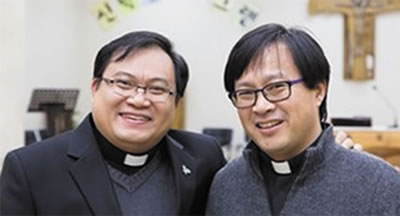
In the Church, the notion of synodality underscores the profound understanding that the mission of the Church is a shared responsibility, involving all its members. Lay people are not merely recipients of pastoral care; they are active participants in the Church’s mission. In this context, the Columban Lay Missionaries stand out as a compeling model for fostering a synodal community.
A significant experience that underscores this synodal approach occurred when I accompanied a group of young professionals from Korea visiting Taiwan for the Society Invitation to Mission. This group consisted of one man and four women, and our Society General Council Member Fr. Kang Seung-Won Joseph. They were all keen to explore the life and work of missionaries in Taiwan.
Throughout their week-long stay, Lee Jiyoung Tina, one of our Korean lay missionaries, accompanied our group as we took them to various ministries where Columban missionaries were engaged. Language barriers did not deter the participants’ interaction with the local people; simple gestures and smiles bridged the gap. Despite the tightly packed schedule, they enthusiastically participated and cherished every moment of their visit.
As their time in Taiwan drew to a close, we gathered for a simple sharing session after completing all our scheduled activities. The majority of the feedback was positive, but one particular comment left a lasting impression on me. One participant expressed how impressed she was by the way I addressed Tina. I affectionately referred to her as “Nuna,” which means “elder sister” in Korean. In contrast, Tina occasionally addressed me by my name, rather than the formal “Sinbunim,” which means “Father” in Korean.
In Korean culture, it is uncommon for priests to refer to elder lay persons as “Nuna” or “Hyung” (elder brother). This small yet significant departure from tradition is a shift away from hierarchical approach within the Church.
Even though Pope Francis has emphasized the need to empower laypeople within the Church and has recognized their vital role, a priestcentered culture still prevails. This becomes evident when examining the language and dynamics within the Church. While fostering friendships between priests and laypeople may not resolve all the Church’s issues, it is a step toward reducing the impact of priest-centeredness.
In the Taiwan Mission Unit, I recently joined the Lay Missionary Leadership Team (LMLT). This marked my second term in this capacity. I firmly believe that, working as part of this team alongside lay missionaries is a tangible manifestation of God’s grace. This offers many opportunities for us to effectively practice synodality within the Church.
Fr. Seok Jin-Wook Antonio serves on the lay missionary leadership team in Taiwan.